Abstract
In the present study, the minimal inhibitory concentrations and minimal bactericidal concentrations of moxalactam, cefamandole lithium, ampicillin, and chloramphenicol were determined, both in broth and on solid medium, against 75 non-beta-lactamase-producing and 25 beta-lactamase-producing strains of Haemophilus influenzae. Most of the 75 strains were inhibited or killed by 2 microgram or less of ampicillin, chloramphenicol, or moxalactam per ml, but cefamandole exhibited poor bactericidal activity against 11 non-beta-lactamase-producing strains, of which 9 were non-type B H. influenzae. Most of the 25 beta-lactamase-producing H. influenzae were resistant to 128 microgram of ampicillin per ml. Both moxalactam and chloramphenicol, which had minimal inhibitory concentrations of less than 0.25 and 2 microgram/ml, respectively, were more active than cefamandole, which had a minimal inhibitory concentration ranging from 2 to greater than or equal to 128 microgram/ml.
Full text
PDF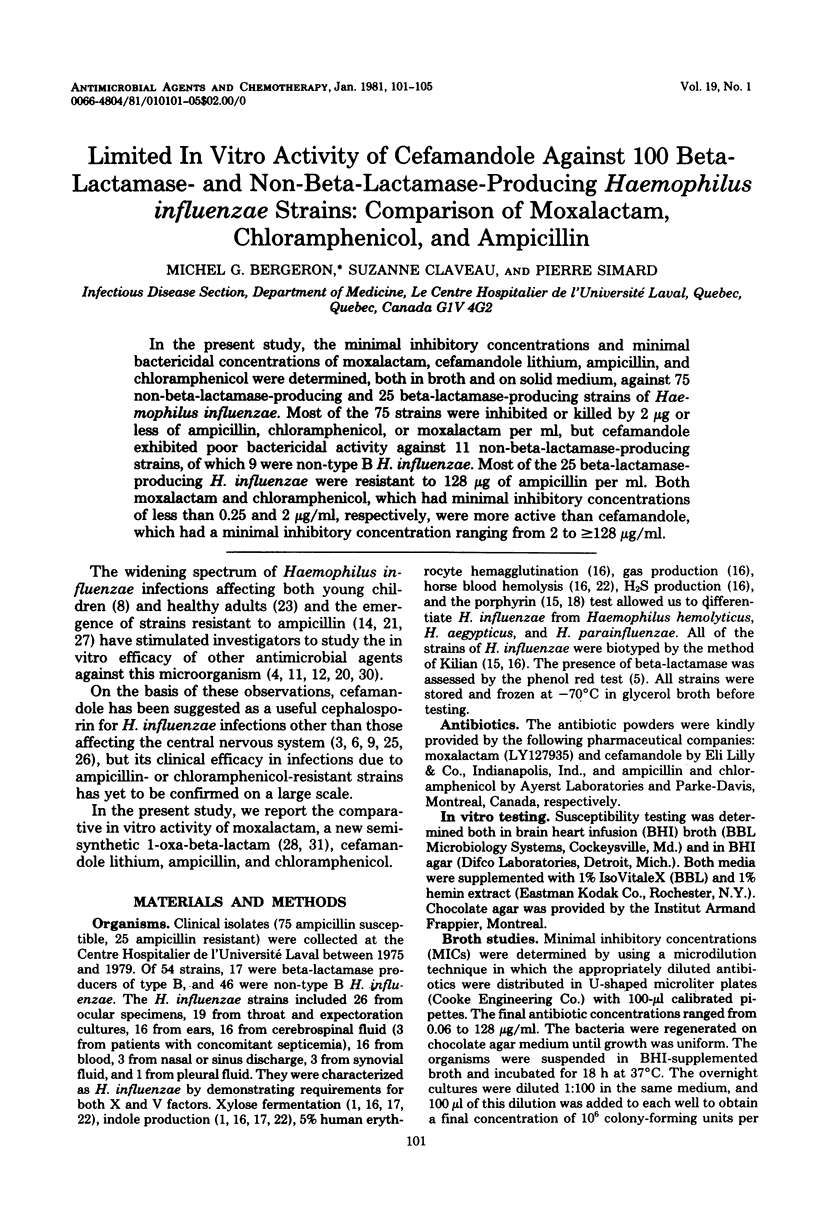
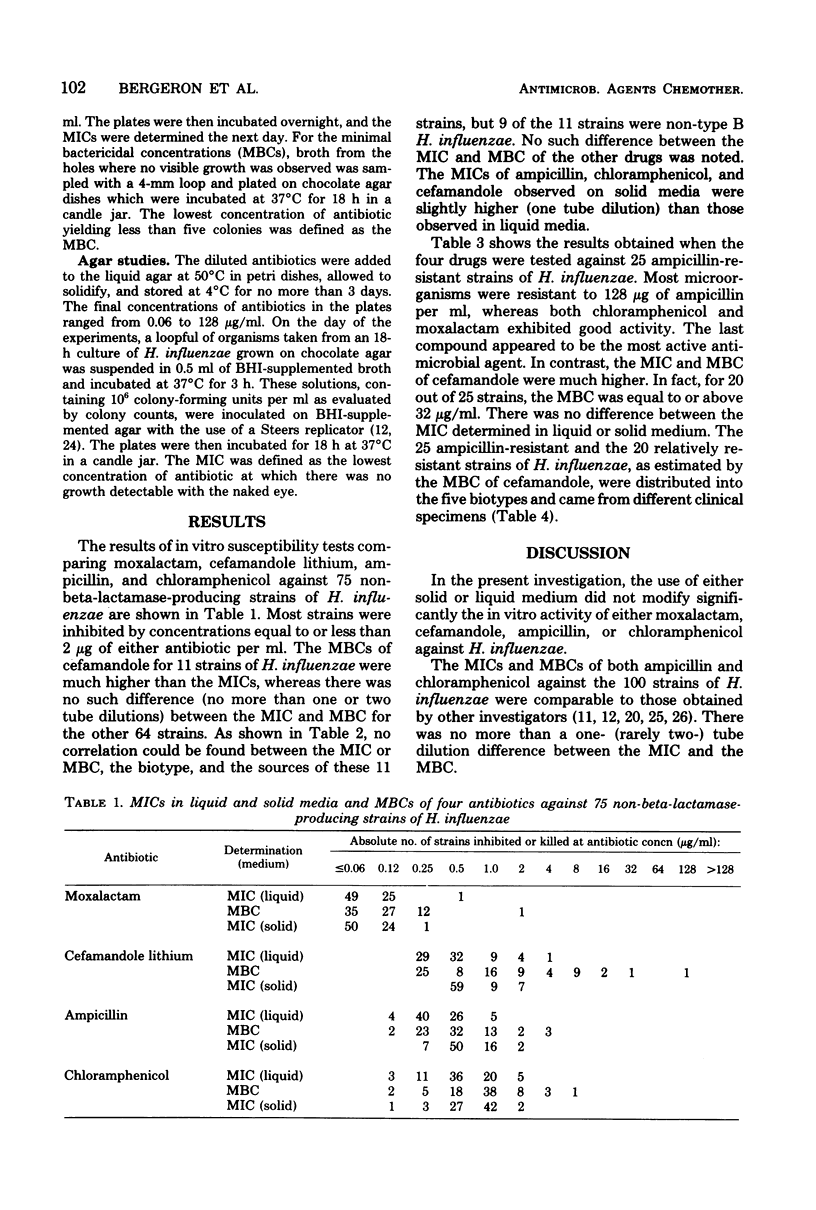
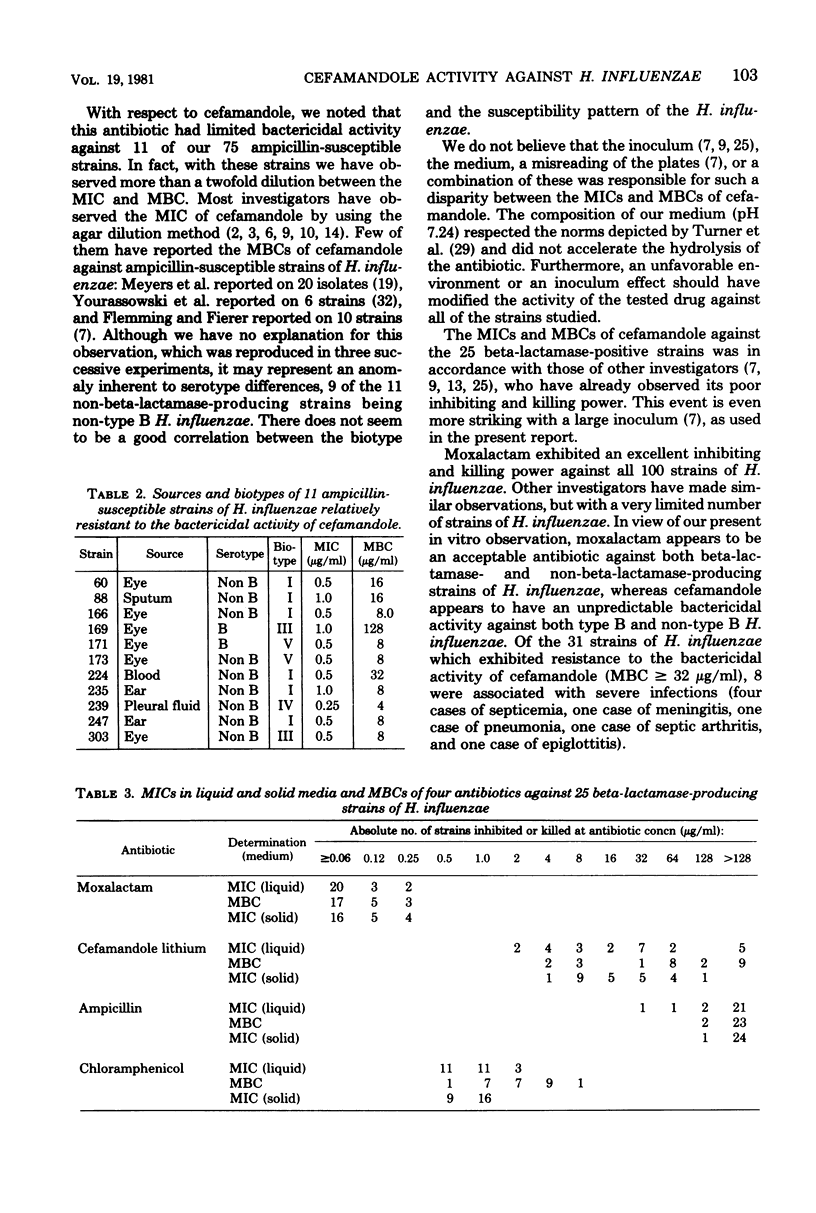
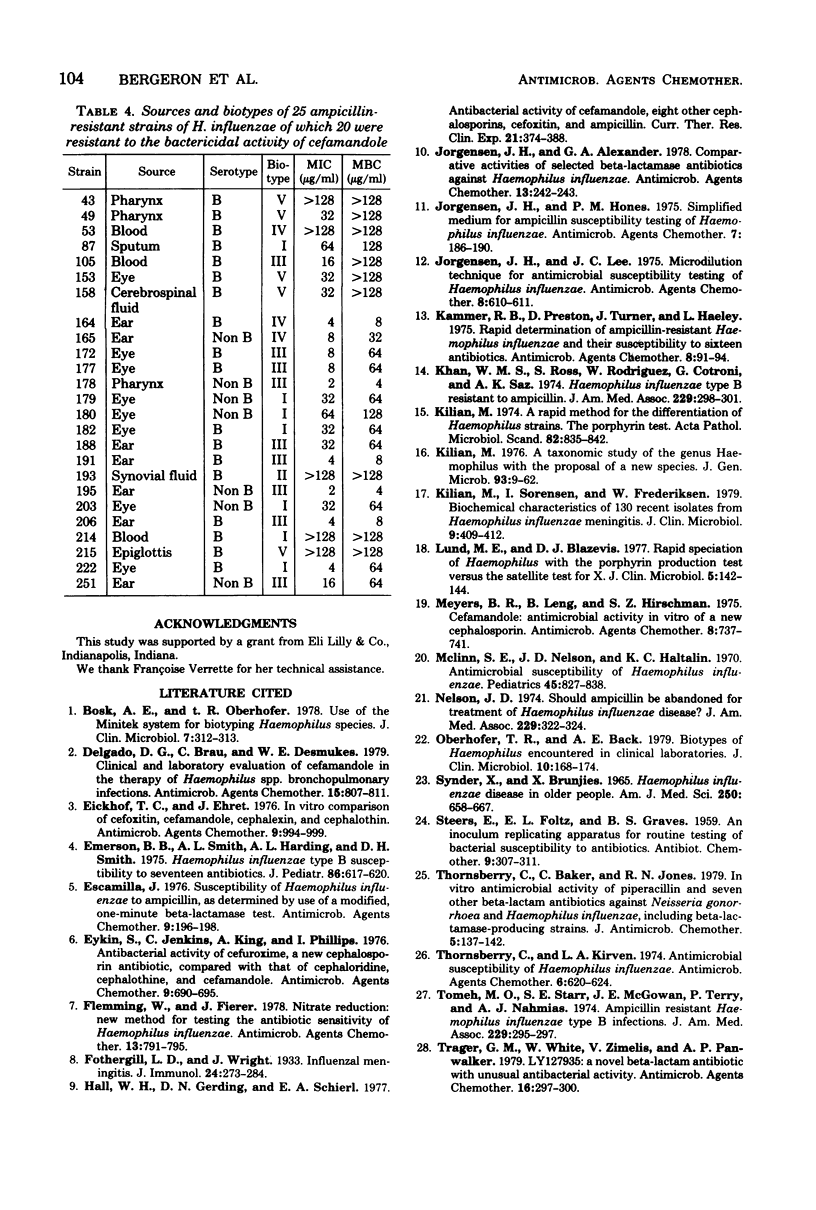
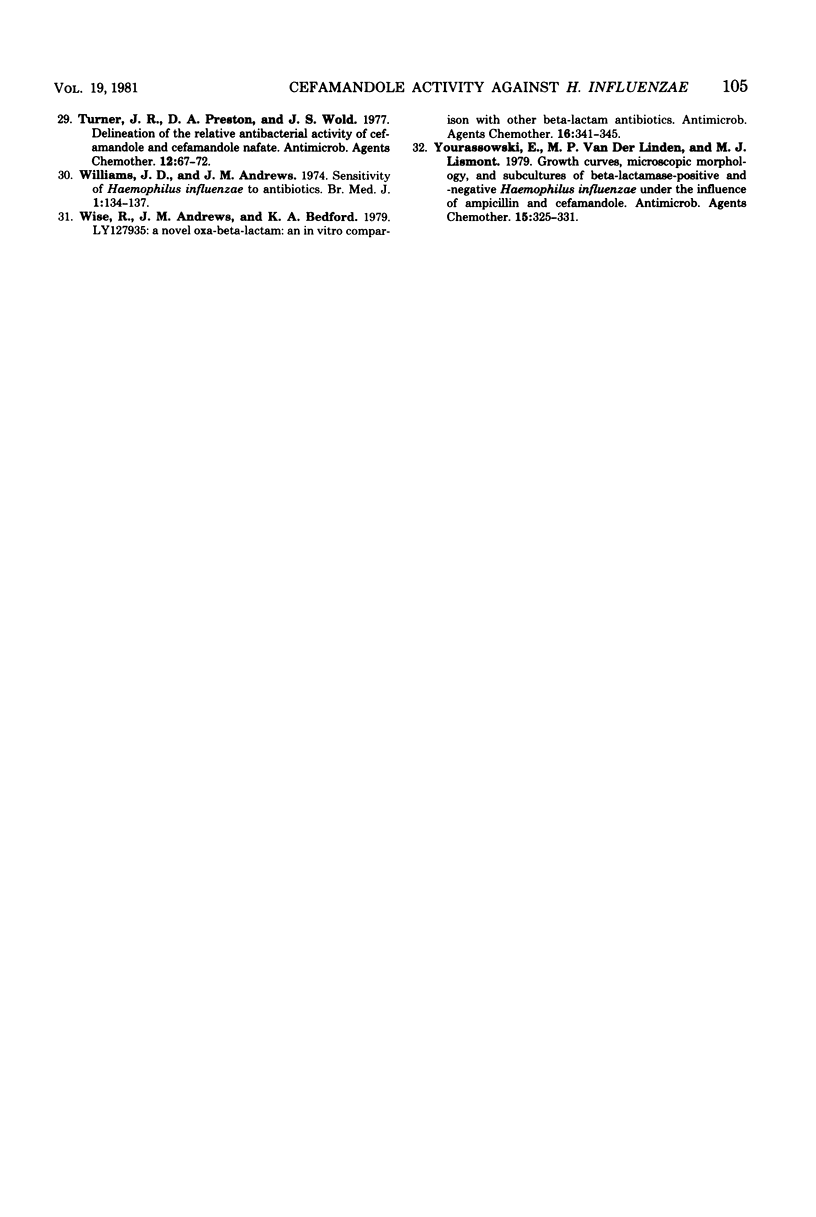
Selected References
These references are in PubMed. This may not be the complete list of references from this article.
- Back A. E., Oberhofer T. R. Use of the Minitek system for biotyping Haemophilus species. J Clin Microbiol. 1978 Mar;7(3):312–313. doi: 10.1128/jcm.7.3.312-313.1978. [DOI] [PMC free article] [PubMed] [Google Scholar]
- Delgado D. G., Brau C. J., Cobbs C. G., Dismukes W. E. Clinical and laboratory evaluation of cefamandole in the therapy of Haemophilus spp. Bronchopulmonary infections. Antimicrob Agents Chemother. 1979 Jun;15(6):807–812. doi: 10.1128/aac.15.6.807. [DOI] [PMC free article] [PubMed] [Google Scholar]
- Eickhoff T. C., Ehret J. M. In vitro comparison of cefoxitin, cefamandole, cephalexin, and cephalothin. Antimicrob Agents Chemother. 1976 Jun;9(6):994–999. doi: 10.1128/aac.9.6.994. [DOI] [PMC free article] [PubMed] [Google Scholar]
- Emerson B. B., Smith A. L., Harding A. L., Smith D. H. Hemophilus influenzae type B susceptibility to 17 antibiotics. J Pediatr. 1975 Apr;86(4):617–620. doi: 10.1016/s0022-3476(75)80166-1. [DOI] [PubMed] [Google Scholar]
- Escamilla J. Susceptibility of Haemophilus influenza to ampicillin as determined by use of a modified, one-minute beta-lactamase test. Antimicrob Agents Chemother. 1976 Jan;9(1):196–198. doi: 10.1128/aac.9.1.196. [DOI] [PMC free article] [PubMed] [Google Scholar]
- Eykyn S., Jenkins C., King A., Phillips I. Antibacterial activity of cefuroxime, a new cephalosporin antibiotic, compared with that of cephaloridine, cephalothin, and cefamandole. Antimicrob Agents Chemother. 1976 Apr;9(4):690–695. doi: 10.1128/aac.9.4.690. [DOI] [PMC free article] [PubMed] [Google Scholar]
- Fleming W., Fierer J. Nitrate reduction: new method for testing the antibiotic susceptibility of Haemophilus influenzae. Antimicrob Agents Chemother. 1978 May;13(5):791–795. doi: 10.1128/aac.13.5.791. [DOI] [PMC free article] [PubMed] [Google Scholar]
- Jorgensen J. H., Jones P. M. Simplified medium for ampicillin susceptibility testing of Haemophilus influenzae. Antimicrob Agents Chemother. 1975 Feb;7(2):186–190. doi: 10.1128/aac.7.2.186. [DOI] [PMC free article] [PubMed] [Google Scholar]
- Jorgensen J. H., Lee J. C. Microdilution technique for antimicrobial susceptibility testing of Haemophilus influenzae. Antimicrob Agents Chemother. 1975 Nov;8(5):610–611. doi: 10.1128/aac.8.5.610. [DOI] [PMC free article] [PubMed] [Google Scholar]
- Kammer R. B., Preston D. A., Turner J. R., Hawley L. C. Rapid detection of ampicillin-resistant Haemophilus influenzae and their susceptibility to sixteen antibiotics. Antimicrob Agents Chemother. 1975 Jul;8(1):91–94. doi: 10.1128/aac.8.1.91. [DOI] [PMC free article] [PubMed] [Google Scholar]
- Khan W., Ross S., Rodriguez W., Controni G., Saz A. K. Haemophilus influenzae type B resistant to ampicillin. A report of two cases. JAMA. 1974 Jul 15;229(3):298–301. [PubMed] [Google Scholar]
- Kilian M. A rapid method for the differentiation of Haemophilus strains. The porphyrin test;. Acta Pathol Microbiol Scand B Microbiol Immunol. 1974 Dec;82(6):835–842. doi: 10.1111/j.1699-0463.1974.tb02381.x. [DOI] [PubMed] [Google Scholar]
- Kilian M. A taxonomic study of the genus Haemophilus, with the proposal of a new species. J Gen Microbiol. 1976 Mar;93(1):9–62. doi: 10.1099/00221287-93-1-9. [DOI] [PubMed] [Google Scholar]
- Kilian M., Sørensen I., Frederiksen W. Biochemical characteristics of 130 recent isolates from Haemophilus influenzae meningitis. J Clin Microbiol. 1979 Mar;9(3):409–412. doi: 10.1128/jcm.9.3.409-412.1979. [DOI] [PMC free article] [PubMed] [Google Scholar]
- Lund M. E., Blazevic D. J. Rapid speciation of Haemophilus with the porphyrin production test versus the satellite test for X. J Clin Microbiol. 1977 Feb;5(2):142–144. doi: 10.1128/jcm.5.2.142-144.1977. [DOI] [PMC free article] [PubMed] [Google Scholar]
- McLinn S. E., Nelson J. D., Haltalin K. C. Antimicrobial susceptibility of Hemophilus influenzae. Pediatrics. 1970 May;45(5):827–838. [PubMed] [Google Scholar]
- Meyers B. R., Leng B., Hirschman S. Z. Cefamandole: antimicrobial activity in vitro of a new cephalosporin. Antimicrob Agents Chemother. 1975 Dec;8(6):737–741. doi: 10.1128/aac.8.6.737. [DOI] [PMC free article] [PubMed] [Google Scholar]
- Nelson J. D. Editorial: Should ampicillin be abandoned for treatment of Haemophilus influenzae disease? JAMA. 1974 Jul 15;229(3):322–324. [PubMed] [Google Scholar]
- Oberhofer T. R., Back A. E. Biotypes of Haemophilus encountered in clinical laboratories. J Clin Microbiol. 1979 Aug;10(2):168–174. doi: 10.1128/jcm.10.2.168-174.1979. [DOI] [PMC free article] [PubMed] [Google Scholar]
- Snyder S. N., Brunjes S. Hemophilus influenzae meningitis in adults. Review of the literature and report of 18 cases. Am J Med Sci. 1965 Dec;250(6):658–667. [PubMed] [Google Scholar]
- Thornsberry C., Baker C. N., Jones R. N. In vitro antimicrobial activity of piperacillin and seven other beta-lactam antibiotics against Neisseria gonorrhoeae and Haemophilus influenzae, including beta-lactamase producing strains. J Antimicrob Chemother. 1979 Mar;5(2):137–142. doi: 10.1093/jac/5.2.137. [DOI] [PubMed] [Google Scholar]
- Thornsberry C., Kirven L. A. Antimicrobial susceptibility of Haemophilus influenzae. Antimicrob Agents Chemother. 1974 Nov;6(5):620–624. doi: 10.1128/aac.6.5.620. [DOI] [PMC free article] [PubMed] [Google Scholar]
- Tomeh M. O., Starr S. E., McGowan J. E., Jr, Terry P. M., Nahmias A. J. Ampicillin-resistant Haemophilus influenzae type B infection. JAMA. 1974 Jul 15;229(3):295–297. [PubMed] [Google Scholar]
- Trager G. M., White G. W., Zimelis V. M., Panwalker A. P. LY-127935: a novel beta-lactam antibiotic with unusual antibacterial activity. Antimicrob Agents Chemother. 1979 Sep;16(3):297–300. doi: 10.1128/aac.16.3.297. [DOI] [PMC free article] [PubMed] [Google Scholar]
- Turner J. R., Preston D. A., Wold J. S. Delineation of the relative antibacterial activity of cefamandole and cefamandole nafate. Antimicrob Agents Chemother. 1977 Jul;12(1):67–72. doi: 10.1128/aac.12.1.67. [DOI] [PMC free article] [PubMed] [Google Scholar]
- Williams J. D., Andrews J. Sensitivity of Haemophilus influenzae to antibiotics. Br Med J. 1974 Jan 26;1(5899):134–137. doi: 10.1136/bmj.1.5899.134. [DOI] [PMC free article] [PubMed] [Google Scholar]
- Wise R., Andrews J. M., Bedford K. A. LY127935, a novel oxa-beta-lactam: an in vitro comparison with other beta-lactam antibiotics. Antimicrob Agents Chemother. 1979 Sep;16(3):341–345. doi: 10.1128/aac.16.3.341. [DOI] [PMC free article] [PubMed] [Google Scholar]
- Yourassowsky E., Van Der Linden M. P., Lismont M. J. Growth curves, microscopic morphology, and subcultures of beta-lactamase-positive and -negative Haemophilus influenzae under the influence of ampicillin and cefamandole. Antimicrob Agents Chemother. 1979 Mar;15(3):325–331. doi: 10.1128/aac.15.3.325. [DOI] [PMC free article] [PubMed] [Google Scholar]


